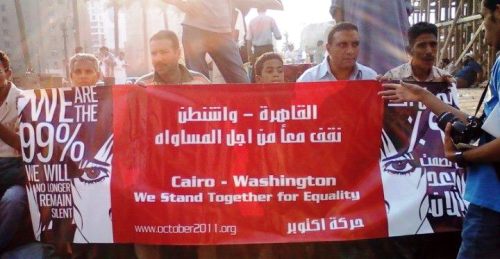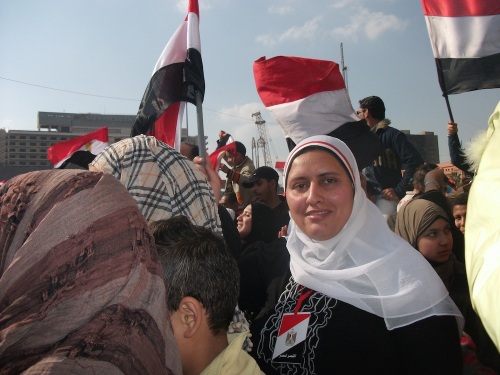Ehsan Yahia, International Outreach Coordinator for the Revolutionary Youth Union and Assistant Lecturer in Nursing at Cairo University.
Q: How did you personally get involved with the Revolutionary Youth Union?
A: This was after January 25th actually. I have been involved in a lot of protests, human rights events before that. And the reason I connected with the American people was I was I studying science at [the University of California, San Diego], and I met Earthkeepers, and I have been [involved in] interfaith … when I got involved with these groups I began to see how they were working for human rights and political awareness. So when I came here and saw the call to go out on the 25th of January. And to tell the truth, I didn’t have in mind that I would go out. And even before the 25th, we had a few protests, like when the church in Alexandria was [bombed] on the 1st of January. We had a protest in front of the lawyers syndicate, but it was a small one … On the 25th, I didn’t think it would end like this … [but] on the 28th the police started killing people, and also we didn’t have a response from Mubarak. I think if he did his speech one day or two after first protest people would come down, they would think he might correct things, but he didn’t do so, and we were lucky he didn’t …
After that we [with the US] we were thinking we wanted to have en event together, we didn’t have the items in mind, we just wanted to do something, they said “we want to support you, we want to support human rights, we want to have an event in Tahrir Square and an event here to support you.”
Q: Right. So I think it’s clear what Americans support about the revolutionary groups in Egypt, what’s maybe less clear are the issues that Egyptians sympathize with Americans on. What issues do you think connect you to the American protestors?
A: First, we have this idea that the American people are so different from the government. You look to the issues like human rights, to stop the war, [etc.]. We have four issues. The first is that the people, in Egypt and US, should be well represented, by election, and this is not just fraud in the elections but by raising the political awareness. We shouldn’t let businessmen buy votes in both countries; the people should be well represented. The second issue is stopping the war, and they refuse a lot of the reactions of the American government regarding foreign affairs. And in Egypt we agree on this especially because now we are trying to make Palestine recognized in the UN, and Obama didn’t want that. And we found the American people, not the government, but the people agree with this. America is wasting a lot of money on the war, where they can use this money on the environment and helping people.
Here, Egyptians, a lot of us [think] there is an Americna dream. You go there, you study, you find a lot of facilities. So when we view [the United States], and it has a lot of facilities, [we think it] could help us as a country. We know that America is helping Egypt, but it gives a lot of funds to the army. We think this money … [should be] redistributed, not just for the weapons and the army, but in the fields of education, and health. The American people want the government to redistribute the money for this stuff. So they see that we agree with them. We understand America is not just the government, and the people are with us.
Q: What do you think is constructive about the Revolutionary Youth Union as opposed to working with a particular party?
A: There are a lot of political parties in Egypt now, we’re not used to this. We just used to have the National Democratic Party, and it was one way. I’m independent. I don’t belong to a political party. I think working without having a [party] interest, I think this better. If I am in a party, I want to have a seat in the parliament, or another long later on, but when you are working as a youth movement, as a group, we want these demands for the people … we want real actions, not just some of us to be in the parliament.
Q: What work are you doing with the international community to make sure the elections run smoothly or that specific demands in protests are met?
A: We have been discussing how to raise political awareness, because this is the first step. We have been working with people form the Czech embassy, and we even had a training program at the Czech embassy on how to monitor the elections. And some of the Egyptians journalists, they will go to Prague to be trained how to cover the event to elections. We were discussing the issue, the problem, of how to get a fair election. We had a brainstorming with the Revolutionary Youth Union and the Lawyers’ Youth Union and others and we see that the main issue here is that people here, especially in the rural area, don’t understand. They’re used to giving their vote to someone who gives them money, or sends them food or something. So they cannot comprehend the idea that this man or this woman will represent them in the parliament. They don’t think like this, because it’s never happened to them.
Q: What kinds of projects have you been working on so far?
A: We have been going to different areas and we have been doing lectures for the people. Before that we had training for the people who are going out and teaching [these civic skills]. I am an assistant lecturer at the faculty of nursing, so I have a lot of students volunteering to raise health awareness. That gets a lot of attention. When we go out in the village, and say we will have a free blood pressure measuring and we will give you some teaching regarding health. Then, some political awareness, and they will come, because they are interested in checking about their health, and then they listen. We combine these things.
Q: Has there been a moment that was particularly rewarding for you?
A: Yeah, when we were in a village near Giza, in a rural area. I found old ladies that were illiterate, that were speaking and discussing, and understanding what we were saying and asking “will these people really represent us?” and “what kinds of things can they do for us?” I found that these people started to understand, and there was a change. Also working with my students. 19 and 18-year-old students, who are generally carefree, are becoming very involved.
Q: How does technology fit into your role as the international outreach coordinator?
A: I’m using social media all the time. We are trying to publish our work, our events. So it helps to get the students involved, get the ordinary people who don’t use the Internet involved. We are getting involved with the Swiss embassy, and the Czech embassy, all of these groups know us from our work on the Internet. I get contacted personally as the admin for the site, people from abroad definitely know us from [our media].
Q: Who do you think of us your biggest international supporters?
A: Right now, I can think of two. The US, and the Czech Republic. The Czech Republic has been doing projects, small projects, but effective. They have been doing a project teaching NGOs raising political awareness. They have been doing this training for journalists I mentioned. The BBC will run a training program here, and then they will go to Prague to do the training program with the media. They have another training starting in November training the organizers.
The main reason the Czech government is supporting the revolution so much is because [of their own revolution]. When I see the pictures of their revolution, it just looks like what was happening here in Tahrir, police were getting women and stuff like this. And they didn’t have social media then, they were just printing papers and going to the villages. I think they see this new revolution, resembling what they did. I have learned things from them. After the revolution, I was saying the secret police should go away, vanish, and when I attended a workshop at the Czech Embassy … they wanted the secret police to go also. But they did not leave, and they are now controlling the economy of the country, because the know everything. So that was a spark, to pursue [specific] reform.
Q: So what do you see as the biggest obstacle for reform going forward?
A: A lot of people who had the biggest position in the previous regime, want to gain those same positions, especially the businessman, they care about their own interest. They don’t care about the people. Also, another thing is … some of the extremists, some of the Islamists. We have been living here in Egypt with Muslims and Christians, we are happy together, they don’t want to kick the Christians out or something like that but they want to make certain rules of the Muslims to be applied on everyone. Even in Islam, when Islam started, the Prophet Mohammed [bifobf], he was living with Christians and Jews, and they were living according to their religions. So some of the some extremists pose some problems.
Q: How do you see the work of the Revolutionary Youth Union after the elections?
A: I think we will have some constructive projects. We will forget about the elections. We will start to work about the construction of health, education … the ideas of the youth. So we will help with that and let the parliament do its work.
Q: Do you see an international movement emerging between Egypt and the United States?
A: Yeah, I really like the slogan, “stop the machine, create a new world,” it says it all.
Q: Do you think the Egyptian youth are compelled by what’s going on in the United States, or the UK, or Greece?
A: Yeah, they pay attention, most of them. Of course you will see some people who don’t care about what’s going on, but many do and pay attention … We are the 99%, and we will not remain silent any more. And I think it’s true, I think it’s 99%, or even more that don’t want war.
Q: If you had a message for the protestors in Washington, what would you say?
A: Keep going ahead, don’t look back no matter what happens. Be there, stand there.


